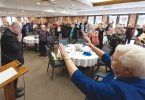Ministry launched for parents experiencing loss during pregnancy
by Joe Bollig
joe.bollig@theleaven.org
KANSAS CITY, Kan. — After a long struggle to conceive, Becky and David Dixon were overjoyed to learn in late 2007 that they were going to have a baby.
But it was not to be. Instead of becoming parents, they became a statistic. In February 2008, after 12 weeks, Becky Dixon experienced a miscarriage.
“No one — not my sisters or my mother — had a miscarriage,” she said. “I was unaware of anyone I knew who had a miscarriage. It wasn’t on my radar that it was a possibility. I was just really in shock.”
Miscarriage is a lot more common than many realize.
One in four women who become pregnant in their lifetimes experience a miscarriage, according to WebMD. The rate is 14 percent for women ages 20 to 29, and increases to 28 percent for women ages 38 to 40.
Although crushed and heartbroken, the Dixons didn’t have time to mourn. Becky worked as a CPA, and the miscarriage happened in the middle of the busiest time of the year.
Instead, she did what a lot of couples do after a miscarriage. She put it all behind her and tried to move on with her life.
But it didn’t work.
“In early April, it crept back up for me,” she said. “I was very depressed for several weeks. It finally all came back and hit me — it resurfaced.”
Many couples mourn their loss quietly, rarely talking about it even among themselves, much less with anyone else, said Ron Kelsey, archdiocesan pro-life consultant. Sometimes they carry their grief for many years.
“Very often, society minimizes miscarriage, [considering it] something that just happens, frequently, and you move on with your life,” said Kelsey. “Couples haven’t necessarily been encouraged to stop and recognize the loss of a child or share the grief of losing a child.”
This is no longer the situation in the Archdiocese of Kansas City in Kansas.
Under the direction of Archbishop Joseph F. Naumann, the archdiocese launched a ministry to assist and console parents who have lost a child before birth, a stillborn child, or a child who dies soon after birth.
This fall, with the assistance of the archdiocesan pro-life office, new clergy binders and parent resource packets were distributed to all the parishes.
The clergy packet — “Miscarriage and Early Childhood Loss: Clergy Resource Binder” — includes the Rite for the Blessing of a Child in the Womb, and the Order for the Naming and Commendation of an Infant Who Died Before Birth, among other things.
And the parent packet includes “Miscarriage and Early Childhood Loss: A Handbook for Parents,” “Mourning a Miscarriage: Prayers for a Couple Grieving the Death of Their Unborn Child,” information from Catholic Cemeteries about burial arrangements following a miscarriage, and a letter from Archbishop Naumann.
“My involvement [in miscarriage ministry] goes back to when I was in St. Louis, when I was director of the pro-life office,” said Archbishop Naumann.
“A need [for the ministry] surfaced from a variety of places,” he continued, “hospital chaplains, my own experiences in parishes with couples . . . and from a feeling that the church should do more for couples that experience the loss of a child before birth [or stillborn].”
One of the challenges of the ministry is that parishes are often unaware that the loss has taken place, he said. Often, couples suffer alone without support.
“So, one of the things we’ve tried to do is ask parishes to encourage couples . . . to let the parish know, so the parish could pray for the couple and the unborn newest parishioner,” said the archbishop. “In doing that, the parish becomes aware of couples who experience miscarriage.”
Independently of the archbishop, various individuals had approached Kelsey and vicar general Father Gary Pennings about the need for a miscarriage and stillborn ministry.
One of those individuals was Becky Dixon, who knew Kelsey through her work as a parish respect life coordinator.
“I mentioned to Ron that I definitely felt that this was a needed ministry, because for me personally at that time, I was blindsided by the event and hadn’t any idea how many women had miscarriages until I had mine,” she said. “You need to have some sort of support system out there to help you through that time.”
Another person who talked to Kelsey and Father Pennings was Virginia Saiki, a member of St. Paul Parish in Olathe. Her experience with miscarriage was very difficult, because she had five.
“When I had the last miscarriage, the law had changed, so the parents could have the baby’s body,” she said. “Before that, you could not. The doctors treated them as [medical waste].”
When she miscarried the fifth time, she called Father Pennings, who helped her through her grief and conducted a burial service.
“I did not know what to do, but I didn’t want my baby thrown away with the trash,” she said. “[Father Pennings said, ‘No, we’ll have a funeral.’ This was the first time it ever happened to me. It was so healing compared to [before].”
Saiki named her child Timmy and now has a grave to visit.
“I can see all five of them,” she said. “I would have done the same for all five of them. . . . With the other ones, I felt empty; it was a terrible ending.
“So the ministry is so important to have that closure.”
Additionally, Saiki attends the annual Mass of the Innocents, because “it’s one more thing I can do for them.”
Becky Dixon was not, unfortunately, able to bury her child, who she named Abigale. For her, too, the annual Mass of the Innocents provides a place to remember the child.
There is no “one size fits all” approach in the miscarriage ministry, said Kelsey. Couples find themselves in a variety of situations, so the ministry is necessarily flexible and offers a variety of resources and ways to participate.
Parents who would like to obtain a packet that includes “Miscarriage and Early Childhood Loss: A Handbook for Parents” can contact Kelsey by calling (913) 647-0350; sending an email to him at: prolife@archkck; or writing to: Pro-Life Office, Archdiocese of Kansas City in Kansas, 12615 Parallel Pkwy., Kansas City, KS 66109.






